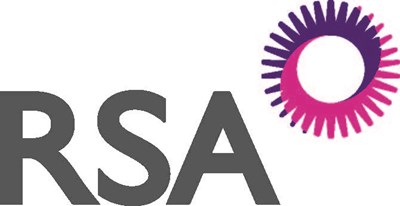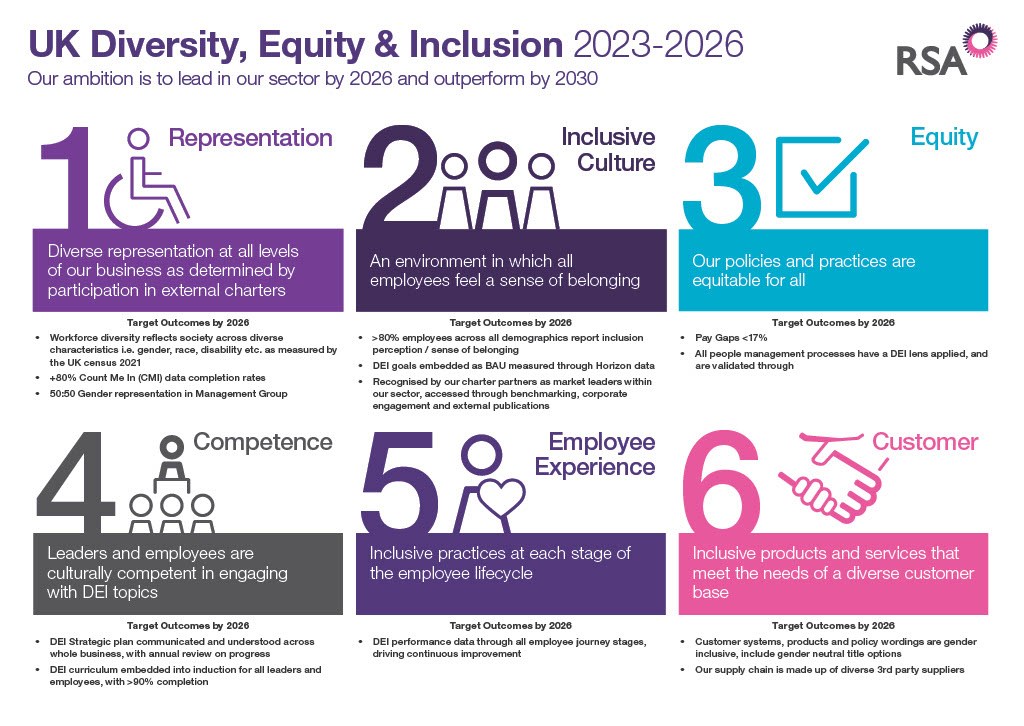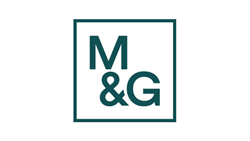Grow
This theme has the following objectives:
- Foster a sector-wide culture that allows everyone employed in insurance and long-term savings to reach their full potential.
- Create environments that retain people even when their circumstances change or they experience significant life events.
- Embed and expand a diverse pipeline of talented people across the sector to be appointed to leadership and executive roles.
This theme focusses on work we can do for existing employees in the sector.
Under this section, we look at the various external and ABI-led charters and initiatives that our Blueprint recommends our members sign up to. Although aspects of these charters are equally relevant to the ‘Attract’ and ‘Advance’ themes, we include them under the ‘Grow’ theme because they are a way of providing transparency over whether any commitments that a firm makes in its external communications are delivered in reality for employees.
We also want our DEI Blueprint to promote practical action (not just target-setting), so we look at two areas we have particularly focussed on which help employees and allow them to progress in their careers – mental health support and secondments.
External Charters and Benchmarks: Aligning the sector around leading practice
Our DEI Blueprint brings together a range of initiatives targeted at specific issues, characteristics or groups into a single cohesive strategy for DEI.
As part of this, we identified three external charters and schemes that we recommend our members sign up to.
- Government’s Women in Finance charter
- Business in the Community’s Race at Work Charter
- Government’s Disability Confident employer scheme
Women in Finance Charter
Our 2023 aim for the Women in Finance Charter was to increase the number of firms signing the charter so that at least 50 firms have become signatories. We have met this aim - 43 of our members are signatories, along with 7 of our associate members.
The Women in Finance Charter is also having a genuine impact on the representation of women in our sector:
- Data from our annual DEI collection also shows that representation of women on boards has increased from 19% in 2017 to 32% in 2022.
- Representation of women on executive teams has increased from 22% in 2017 to 29% in 2022.
- 69% of companies now set representation targets for women at the executive team level, an increase from 2021.
 However, we recognise that this progress – while welcome – is too slow and not yet substantial enough, especially in the context of 58% of entry-level equivalent roles in the sector being held by women.
However, we recognise that this progress – while welcome – is too slow and not yet substantial enough, especially in the context of 58% of entry-level equivalent roles in the sector being held by women.
We expect to see more progress as firms adopt the practical steps we recommend, so that more women are able to advance into executive and board roles, and people who are in less senior roles can better balance their careers with family life and other interests. We continue to support Aviva’s Amanda Blanc in her role as the Women in Finance Charter Champion, and we want to use our DEI Network to share updates on the Charter to ensure our sector stays committed to it.
Building a more inclusive insurance industry is vital if we’re to deliver the best value for our customers. It’s good to see progress across the sector this year but we can all speed up action. DEI must continue to be a priority and we support the practical steps the ABI has set out in its Blueprint lasting change.
Jonny Briggs, Diversity Equity Inclusion & Resourcing Director, Aviva
Race at Work Charter
Our 2023 aim for Business in the Community’s Race at Work Charter was to campaign so that 50 firms become signatories. We have met this aim, with have 42 members and 15 associate members signed up, which brings us to a total of 57.
Our data collection also shows an improvement in the proportion of black and minority ethnic employees at senior levels. We are especially pleased to see that ethnic minority representation at board level has increased from 2% in 2021 to 6% in 2022. Again, more work is required to make further progress.
The charter outlines seven key actions for signatories. Action number five emphasizes the importance of supporting career progression for ethnically diverse employees, including Black, Asian, Mixed Race, and others. It calls for specific measures like implementing two-way mentoring and sponsorship.
Our member and Race at Work charter signatory Direct Line Group has developed a reverse mentoring programme to act as a catalyst for driving meaningful change to support greater inclusion for employees from diverse backgrounds, especially Black colleagues.
As part of their diversity and inclusion strategy, Direct Line Group ran a Reverse Mentoring Programme over 2021/2022, and it was a catalyst for driving meaningful change to support greater inclusion for employees from diverse backgrounds, especially their Black colleagues. 
The aims of the programme were to:
-
Grow leadership understanding
Enable senior leaders within the company to understand and appreciate the challenges and barriers faced by colleagues. Equipped with this knowledge, to ensure leaders are better positioned to drive more equitable practice and support greater inclusion. -
Support reverse mentors' careers
Provide reverse mentors with the opportunity to influence Direct Line Group’s culture and gain valuable career advice. Alongside, to enable reverse mentors to make new connections with senior leaders across the business and gain business insights.
Direct Line Group connected 60 leaders, including their Executive Committee, with colleagues from diverse communities across the business. A significant number of relationships were made with Black colleagues.
Implementation
Direct Line Group worked with an external specialist to guide and support implementation of this reverse mentoring programme.
To find volunteer mentors they worked closely with their employee resource groups, especially their REACH (Race, Ethnicity and Cultural Heritage) network.
This was followed by a matching process to ensure partners had different backgrounds and were aligned to what each side was looking to gain from the relationship.
Once pairs were finalised, participants were briefed and guidelines, including a conversation framework, were shared to encourage trust and kick-start relationships.
The programme lasted 12 months, during which regular touchpoints were established to gain insights and provide further support where needed.
At the end of the programme, close out sessions were held to consolidate feedback with the CEO sending a thank you to letter to reverse mentors to recognise their contributions.
Key lessons
Direct Line Group have found that a reverse mentoring programme is a great initiative for organisations looking to establish a firm foundation for change. Their top learnings are:
- Participant support - successful reverse mentoring requires vulnerability from participants and is based on a very different power dynamic. Briefing sessions and conversations guides are a critical part of ensuring reverse mentors and mentees are set up for success.
- Recognition – there is a burden placed on minoritised communities through programmes such as reverse mentoring, so while they can be invaluable at a moment in time, it is important that they are timebound and lead to subsequent action and positive change.
- Expectations – it is critical that people are clear on what a reverse mentoring programme involves and are actively choosing to participate and make the space to do so. Without this commitment, relationships can fail before they have even started.
Looking to the future
To further support Black inclusion the Group are participating in the 10,000 Black Interns Programme, launched and embedded their Anti-Bullying & Harassment polies, further supporting career progression of Black women to senior levels through talent interventions, supporting young people from disadvantaged backgrounds through their Community Fund and are signatories of the Business in the Communities Race at Work Charter. As a result of these initiatives, today 85% of Direct Line Group’s Black colleagues say it is a highly inclusive place to work, up 18 points from 2020.
Disability Confident Employer scheme
Our aim for the government’s Disability Confident Employer scheme was for 50 firms to become signatories. We have almost met this aim, with 33 members and 17 associate members signed up, bringing us to a total of 50 firms.
We will campaign for more members to sign all charters. We also recognise that signing any charter should be a well-informed and purposeful act, which also means ensuring that internal processes support the requirements of each charter.
Flexible Work and Parental Leave: Helping Employees Facing Changes in their Circumstances
 In addition to the three external charters outlined above, we have developed two voluntary initiatives for our own members to promote best practice on Flexible Work and Parental Leave.
In addition to the three external charters outlined above, we have developed two voluntary initiatives for our own members to promote best practice on Flexible Work and Parental Leave.
We continue to place a particular emphasis on these areas because, by doing more to help employees when their life circumstances change, we can retain their talent and experience. This provides a larger talent pool to recruit into senior positions in future.
We have not seen as many firms join these two initiatives as have signed the external charters we recommend – but we are committed to continuing to support more of our members to take action in this area. We continue to have the aim of reaching 50 signatories for each.
We have had encouraging conversations with members firms this year and hope to announce further signatories in 2024. Our ambition is also to look at how we can extend the ABI’s existing policy initiatives to include information on other major life events, such as care responsibilities; fertility treatment; bereavement; miscarriage; menopause; injury or ill-health; and being a victim of crime.
Our member firm RSA has equitable DEI policies, such as extended parental leave and paid carers leave as a key part of their DEI strategy.
 Becoming the best employer and ensuring that their people are engaged are key elements of RSA's journey to outperformance. Seeing diversity as a strength is at the heart of who they are.
Becoming the best employer and ensuring that their people are engaged are key elements of RSA's journey to outperformance. Seeing diversity as a strength is at the heart of who they are.
Over the last couple of years, they have done a great deal of work in this space, through policy change – such as extending parental leave, implementing new support provisions such as paid Carers Leave or Domestic Abuse Leave.
RSA have moved the dial on increasing female representation and taken steps in reducing their gender pay gap. Not to mention the incredible work their Employee Resource Groups do.
They have come a long way and have lots to be proud of.
RSA knows they have work to do to reach their ambition of leading their sector in DE&I by 2026 and outperform by 2030. And so, they have spent time reviewing their Diversity, Equity, and Inclusion strategy. They have developed a set of levers, success measures and priorities to support this (informed by external insight and benchmarking which includes the ABI DEI Blueprint)
- Representation
- Inclusive Culture
- Equity
- Competence
- Employee Experience
- Customer

ABI Making Flexible Work Charter, launched in 2021
Signing this charter commits companies to making the majority of roles open to flexible working (including part-time and job-share arrangements), publishing details of their flexible working policies and to putting in processes and guidance to support and promote different forms of flexible working.
27 firms signed this charter when it was launched in April 2021. We have now increased this to 36 firms.
Our data collection shows that 100% of firms now offer a form of flexible working to their employees and the number of companies offering job-shares has increased from 61% when our charter was launched to 76%.
ABI Transparent Parental Leave and Pay initiative, launched in 2019
Transparency on pay and parental leave is a key element of ensuring workplaces are inclusive and welcoming to working parents. Our members who join this initiative commit to making information on parental pay policies transparent and easily accessible on their public websites.
21 firms signed this charter when it was launched in September 2019. We have now increased this to 33 firms.
Our data collection shows that the number of firms who offer enhanced shared parental pay to their employees has increased from 58% when the initiative was launched to 76%.
Mental Health Support on the Rise
The proportion of companies offering products and support for mental health has remained high or improved since 2021, with 91% of companies now offering group income protection and 100% offering group health insurance.
 Mental Health first aid training has also become much more common. 100% of firms now facilitate this, an increase from 52% in 2017 and 75% in 2018.
Mental Health first aid training has also become much more common. 100% of firms now facilitate this, an increase from 52% in 2017 and 75% in 2018.
100% of firms also offer employee assistance programmes.
In the future, we hope to see member firms adapting their mental health awareness programmes to look at the unique experiences some groups face or to support people with challenging circumstances, such as bereavement.
This is especially important when promoting an intersectional approach to DEI that recognises that people may have multiple needs that they require support with and a recognition that people may have additional or different needs after life events or changes in their personal circumstances. Employers do play a role in preventing further disadvantage, including mental health problems caused by individuals feeling the need to mask their true selves at work.
Secondments: Building a more diverse leadership pipeline
Although progress has been made to improve parity on gender and minority ethnic representation at senior levels of organisations in our industry, more needs to be done to understand how we can speed up this progress, but also have more information on other diversity characteristics such as socio-economic background in senior levels.
Our DEI Blueprint highlights secondments as a practical step that firms can take to build a more diverse talent pool for senior roles. These can be within firms, across the sector or even arranged in partnership with clients or the public sector. By giving people the opportunity to experience new roles, work on different projects, secondments help ensure that more people have the knowledge and experience needed when permanent positions are advertised (as well as allowing resources to be allocated to business priorities).
To address underrepresentation at senior levels, our member firm M&G have built "Aspire”, an internal mobility program.
 With a focus on nurturing and developing internal talent, to ensure a diverse pipeline for the future, M&G have developed Aspire - an internal career exploration and skills development programme in the UK.
With a focus on nurturing and developing internal talent, to ensure a diverse pipeline for the future, M&G have developed Aspire - an internal career exploration and skills development programme in the UK.
Background
The Aspire programme is open to everyone but targeted toward talented Black, Asian, and ethnic minority colleagues who want to explore the option to become leaders in customer, distribution, and client-facing investment roles.
As they progress through the programme the cohort receive coaching, mentoring and ongoing training. M&G give them the opportunity, time and focus they need to shape and influence their career as they look to transition into vital customer and client-facing roles.
The successful candidates for the 2021/22 programme comprised a cohort of 82% identifying as Black, Asian or minority ethnic and 64% women.
Outcomes and Next Steps
Building on the success of the 2021/22 programme, where 80% of participants moved permanently into a role in our customer, distribution and investment teams, M&G are now embarking on the 2023/24 cohort, where there are 11 secondment opportunities within their Asset Management and Retail and Savings team.
The successful candidates for this year’s programme will additionally benefit from the insights and mentoring from last year’s cohort – effectively paying forward the insights and knowledge gained from the programme.
Depending on firms’ priorities, similar programs can be built for individuals from other backgrounds to create a future talent pipeline and to foster a culture that supports progression of all employees regardless of their background.

